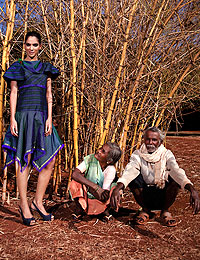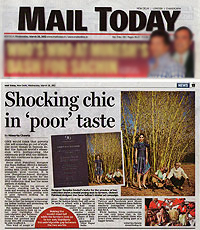 The great Indian landscape, say glittery marbled and pleadingly barren at the same time is traversed by a diverse lot, as varied as ‘emperor’s-new-clothes’ to ‘no-clothes’ types. And from ‘deep throats’ to dry ones it listens quite deferentially.
The great Indian landscape, say glittery marbled and pleadingly barren at the same time is traversed by a diverse lot, as varied as ‘emperor’s-new-clothes’ to ‘no-clothes’ types. And from ‘deep throats’ to dry ones it listens quite deferentially.
It’s this diversity which we are much proud of but only if inhabiting the greener pastures. The sense of exotica (if seen from the windows of the customized settings) layered with poignancy gushing from every nook and corner that poverty in India has on offer made Slumdog Millionaire bag a fistful of Oscars, and we ended up puking their hearts out in eulogies as it portrayed the ironies quite artistically, besides the fact that it was by an English filmmaker who we are very much fond of.
The use of stark contrasts, ironies and bizarre (definitely, causing bewilderment) is a part of artistic expressions to highlight a panoramic view which fashion is no different from. And quite naturally, there are individual opinions galore – taking umbrage to making sense and admiring the artwork. Such clash of different point of views surfaced lately when one of the pictures from Spring Summer 2012 photoshoot of Bangalore based designer Deepika Govind created outrage loud enough to be heard across the glittering corridors of fashion.
bewilderment) is a part of artistic expressions to highlight a panoramic view which fashion is no different from. And quite naturally, there are individual opinions galore – taking umbrage to making sense and admiring the artwork. Such clash of different point of views surfaced lately when one of the pictures from Spring Summer 2012 photoshoot of Bangalore based designer Deepika Govind created outrage loud enough to be heard across the glittering corridors of fashion.
The shot featured a tall imposing model wearing an outfit made of traditional textiles designed by the designer, being looked at by two villagers sitting right next to her. Set in the rural backdrop with a long bush the visual offended few enough to beat around the bush with raised eyebrows and stir the ever hot rich-poor-gap debate guaranteeing the 15 minutes of fame by claiming their moral superiority. The same ‘oh-so-fabulous’ clique who pen and talk ethics, on one hand, and clink glasses, up talk snobbishly and throw sniggers at the bewildered common folks standing outside glitzy fashion shows, on the other.
On one sober thought (considering, it’s fashion) the designer in concern has been engaged with weavers, artisans and craftsmen since long, and working for the revival of dying Indian traditions and crafts. The very collection from which this ‘ensemble cast’ type shoot is taken is also an ode to the weavers of the town of Ilkal in Karnataka, which continues to uphold and make alive a 1400-year-old craft.








